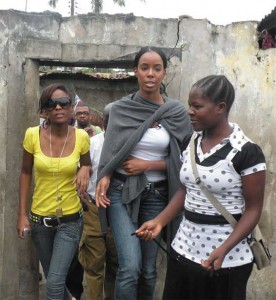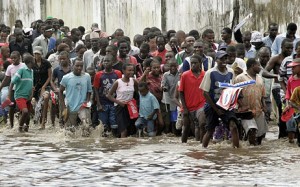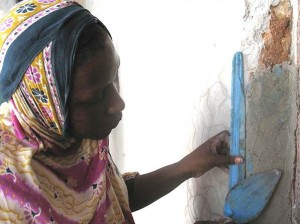R&B superstar Kelly Rowland, formerly of Destiny’s Child, visited Dar-es-Salaam in June to present an MTV Staying Alive Foundation award to a former Tanzanian sex worker named “Eliza” who is now working to save the lives of her former peers. Ms. Rowland is MTV’s 2008 AIDS Awareness Ambassador for the Staying Alive Foundation.
The Staying Alive Foundation and the Tanzania Marketing and Communications for AIDS, Reproductive Health and Child Survival (TMARC) project both provide small grants to support local projects that reach people who are particularly at risk for HIV infection.
Eliza’s Sad Beginnings
Eliza was born in Iringa, and her father abandoned her mother and the family when Eliza was just a baby. When she was 12, her mother “sold” her to a family in Dar-es-Salaaam to work as a house girl. One day when Eliza was 14, the wife of the family went out, and Eliza was brutally raped and beaten by the husband. Bruised and battered, Eliza went to the police station to report what had happened to her, but the police refused to open the case without a bribe. As Eliza was leaving the police station, the wife and husband arrived and claimed that Eliza had been stealing from them, and Eliza was thrown in jail for six months.
After being released from jail, Eliza found her way to Uwanja wa Fisi (Hyena Square), a poor neighborhood in Manzese notorious for alcoholics, addicts and prostitutes. There Eliza met a young woman who invited her to stay in a guesthouse where she lived, and subsequently taught Eliza how to sell her body to men. Eliza managed to live and work under those circumstances for about four years, avoiding the drug use that felled many of her peers.
Despite the horrors of Hyena Square, Eliza had good moments. She cherishes a photo album chronicling a few happy times hanging out with friends. When Eliza shows that album now, she points out all of her friends who are gone – dead from AIDS, malaria, drug overdoses, or the many other diseases and afflictions that are associated with living and working in impoverished conditions. Along the way, Eliza tested positive for HIV. She was devastated at first, but eventually realized that she could live a healthy life by taking care of her health and taking the appropriate drugs.
The Light at the End of the Tunnel
One day, Eliza met some outreach workers from a local organization that had started a counselling booth for people in Hyena Square. She was inspired and started visiting them everyday, and eventually they invited her to join them in their rescue house. Eliza left her room in the guesthouse, started to think about her future, and before long was in the counseling booth, reaching out to her former colleagues with advice on how to escape the lifestyle and start over.
Now in her early 20s, Eliza serves as a role model for many young girls. The Staying Alive Foundation is funding her return to her home region of Iringa, where she will work with young women and their parents to help them understand the consequences of sending their daughters to be “house girls” in Dar es Salaam. She is also educating her community about the devastating consequences of sex work and the trials of HIV.
Kelly Rowland’s Journey to Hyena Square
During Kelly’s visit, she spent time with Eliza and T-MARC staff at their office in Dar es Salaam and then toured Hyena Square meeting and interviewing other sex workers. Kelly spoke with many young women and shared that she grew up in a household with no father like many of them and understands that loss. She also shared that she believes in the power of faith and the perseverance to create a better life, just as she did for herself.
For more see http://www.staying-alive.org and https://pshi.aed.org/projects_tmarc.htm




 People braving torrential rain to see the Olympic Torch procession pass through Dar-es-Salaam
People braving torrential rain to see the Olympic Torch procession pass through Dar-es-Salaam
 L-R Rob Wilson, Tom Levitt MP, Mwanadai Majaar, Douglas Alexander MP
L-R Rob Wilson, Tom Levitt MP, Mwanadai Majaar, Douglas Alexander MP